1996 TOYOTA 4RUNNER wheel
[x] Cancel search: wheelPage 137 of 217
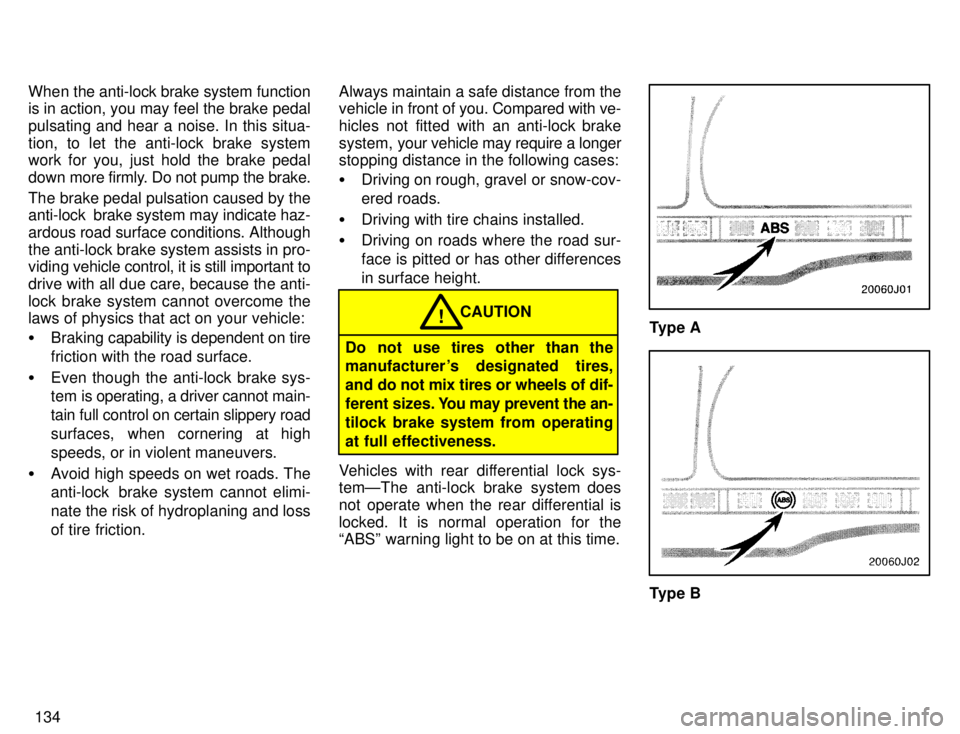
134
When the anti-lock brake system function is in action, you may feel the brake pedal
pulsating and hear a noise. In this situa-
tion, to let the anti-lock brake system work for you, just hold the brake pedal
down
more firmly. Do not pump the brake.
The brake pedal pulsation caused by the
anti-lock brake system may indicate haz- ardous road surface conditions. Althoughthe anti-lock brake system assists in pro-
viding vehicle control, it is still important to
drive with all due care, because the anti-
lock brake system cannot overcome the
laws of physics that act on your vehicle: � Braking capab ility is dependent on tire
friction with the road surface.
� Even though the anti-lock brake sys-
tem is operating, a driver cannot main- tain full control on certain slippery road
surfaces, when cornering at highspeeds, or in violent maneuvers.
� Avoid high speeds on wet roads. The
anti-lock brake system cannot elimi-
nate the risk of hydroplaning and lossof tire friction. Always maintain a safe distance from the
vehicle in
front of you. Compared with ve-
hicles not fitted with an anti-lock brake
system, your vehicle may require a longer
stopping distance in the following cases: � Driving on rough, gravel or snow-cov-
ered roads.
� Driving with tire chains installed.
� Driving on roads where the road sur-
face is pitted or has other differencesin surface height.
CAUTION!
Do not use tires other than the
manufacturer 's designated tires,
and do not mix tires or wheels of dif-
ferent sizes. You may prevent the an-
tilock brake system from operatingat full effectiveness.
Vehicles with rear differential lock sys-
temÐThe anti-lock brake system does
not operate when the rear differential islocked. It is normal operation for the
ABSº warning light to be on at this time.Type A
Type B
Page 141 of 217
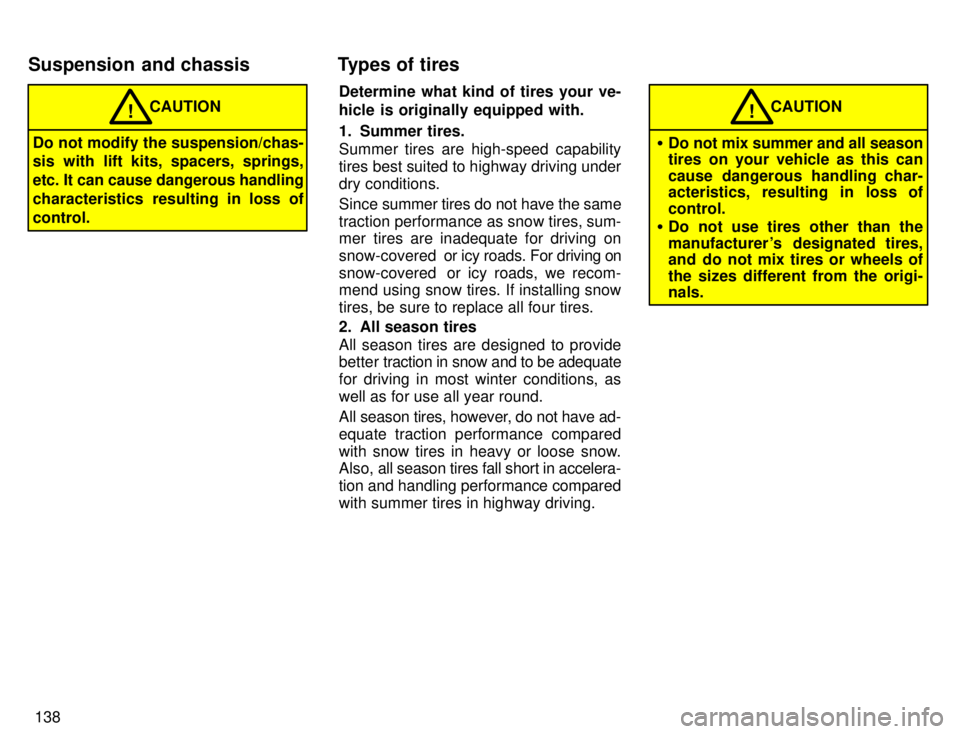
138
CAUTION!
Do not modify the suspension/chas-
sis with lift kits, spacers, springs,
etc. It can cause dangerous handling
characteristics resulting in loss ofcontrol. Determine what kind of tires your ve-
hicle is originally equipped with.
1. Summer tires.
Summer tires are high-speed capability
tires best suited to highway driving underdry conditions. Since
summer tires do not have the same
traction performance as snow tires, sum-
mer tires are inadequate for driving on
snow-covered or icy roads. For driving on
snow-covered or icy roads, we recom-
mend using snow tires. If installing snow tires, be sure to replace all four tires.
2. All season tires
All season tires are designed to provide
better traction in snow and to be adequate
for driving in most winter conditions, as
well as for use all year round.
All season tires, however, do not have ad-
equate traction performance compared
with snow tires in heavy or loose snow.
Also, all season tires fall short in accelera-
tion and handling performance compared with summer tires in highway driving.CAUTION!
� Do not mix summer and all season
tires on your vehicle as this can
cause dangerous handling char-
acteristics, resulting in loss of control.
� Do not use tires other than the
manufacturer 's designated tires,
and do not mix tires or wheels of
the sizes different from the origi- nals.
Suspension and chassis Types of tires
Page 142 of 217

Part 3How to start the engineÐ
(a) Before cranking
Before starting the engine
139
STARTING AND DRIVING �
Before starting the engine
�How to start the engine
�Tips for driving in various conditions
�Off-road driving precautions
�Winter driving tips
�Trailer towing
�How to save fuel and make your
vehicle last longer, too
1. Check the area around the vehicle be-
fore entering it.
2. Adjust seat position, seatback angle,
seat cushion angle, head restraint height and steering wheel angle.
3. Adjust inside and outside rear view mirrors.
4. Lock all doors.
5. Fasten seat belts.
1. Apply the parking brake firmly.
2. Turn off unnecessary lights and acces- sories. 3.
Manual transmission: Press the
clutch pedal to the floor and shift the trans-
mission into neutral. Hold the clutch pedal
to the floor until the engine is started. A
starter safety device will prevent the start-
er from operating if the clutch pedal is not fully depressed.
Automatic transmission: Put the selec-
tor lever in Pº. If you need to restart the
engine while the vehicle is moving, put the
selector lever in Nº. A starter safety de-vice will prevent the starter from operating
if the selector lever is in any drive position. 4. Automatic transmission only: De-
press the brake pedal and hold it to the
floor until driving off.
Page 143 of 217

140Before starting the engine, be sure to fol-
low the instructions in (a) Before crank- ingº.
Normal starting procedure
The multiport fuel injection system/se-
quential multiport fuel injection system in
your engine automatically controls the
proper air-fuel mixture for starting. You can start a cold or hot engine as follows:
1. With your foot off the accelerator ped- al, crank the engine by turning the key to
STARTº. Release it when the enginestarts.
2. After
the engine runs for about 10 sec-
onds, you are ready to drive.
If the weather is below freezing, let the en-
gine warm up for a few minutes before driving.
If the engine stalls...
Simply restart it, using the correct proce- dure given in normal starting. If the engine will not startÐ
See If your vehicle will not startº in Part 4.
NOTICE
�Do not crank for more than 15 sec-
onds at a time. This may overheat
the starter and wiring systems.
�Do not race a cold engine.
�If the engine becomes difficult to
start or stalls frequently, have theengine checked immediately.
� Always slow down in gusty cross- winds. This will allow you much better control.
� Drive slowly onto curbs and, if pos-
sible, at a right angle. Avoid drivingonto high, sharp-edged objects and
other road hazards. Failure to do so
can lead to severe tire damage result-
ing in tire bursts.
� When parking on a hill, turn the front
wheels until they touch the curb so that
the vehicle will not roll. Apply the park-
ing brake, and place the transmission in Pº (automatic) or in first or reverse
(manual). If necessary, block thewheels.
� Washing your vehicle or driving
through deep water may get the
brakes wet. To see whether they are
wet, check that there is no traffic near
you, and then press the pedal lightly. If
you do not feel a normal braking force,
the brakes are probably wet. To dry
them, drive the vehicle cautiously
while lightly pressing the brake pedal
with the parking brake pulled. If they
still do not work safely, pull to the side
of the road and call a T oyota dealer for
assistance.
(b) Starting the engine
Tips for driving in variousconditions
Page 144 of 217
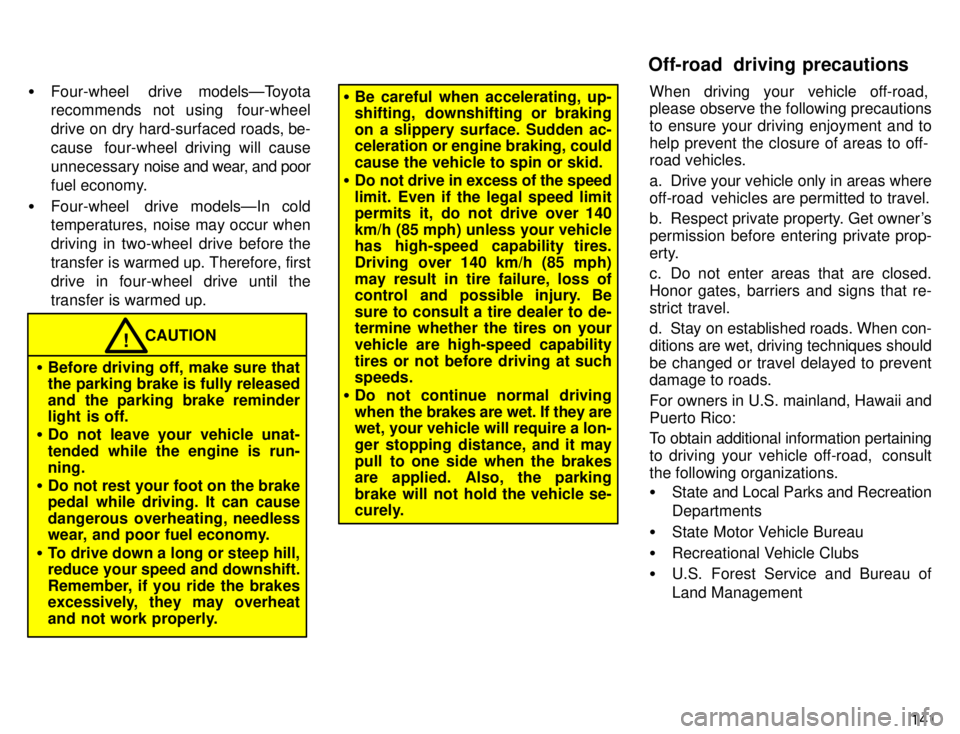
141
�
Four-wheel drive modelsÐToyota
recommends not using four-wheel
drive on dry hard-surfaced roads, be-
cause four-wheel driving will causeunnecessary noise and wear, and poor
fuel economy.
� Four-wheel drive modelsÐIn cold
temperatures, noise may occur when
driving in two-wheel drive before the
transfer is warmed up. Therefore, first
drive in four-wheel drive until the
transfer is warmed up.
CAUTION!
� Before driving off, make sure that
the parking brake is fully released
and the parking brake reminder
light is off.
� Do not leave your vehicle unat- tended while the engine is run-ning.
� Do not rest your foot on the brake
pedal while driving. It can cause
dangerous overheating, needless
wear, and poor fuel economy.
� To drive down a long or steep hill,
reduce your speed and downshift.
Remember, if you ride the brakes
excessively, they may overheat
and not work properly.
�Be careful when accelerating, up-
shifting, downshifting or braking
on a slippery surface. Sudden ac-
celeration or engine braking, could cause the vehicle to spin or skid.
� Do not drive in excess of the speed
limit. Even if the legal speed limit
permits it, do not drive over 140
km/h (85 mph) unless your vehicle
has high-speed capability tires.
Driving over 140 km/h (85 mph)
may result in tire failure, loss of
control and possible injury. Be sure to consult a tire dealer to de-
termine whether the tires on your
vehicle are high-speed capability
tires or not before driving at such speeds.
� Do not continue normal driving
when the brakes are wet. If they are
wet, your vehicle will require a lon-
ger stopping distance, and it may
pull to one side when the brakes
are applied. Also, the parking
brake will not hold the vehicle se-
curely. When driving your vehicle off-road,
please observe the following precautions
to ensure your driving enjoyment and to
help prevent the closure of areas to off-
road vehicles.
a. Drive your vehicle only in areas where
off-road vehicles are permitted to travel.
b. Respect private property. Get owner's
permission before entering private prop-
erty.
c. Do not enter areas that are closed.
Honor gates, barriers and signs that re-
strict travel.
d. Stay on established roads. When con- ditions are wet, driving techniques should
be changed or travel delayed to prevent
damage to roads.
For owners in U.S. mainland, Hawaii and Puerto Rico:
To obtain additional information pertaining
to driving your vehicle off-road, consultthe following organizations. �
State and Local Parks and Recreation Departments
� State Motor Vehicle Bureau
� Recreational Vehicle Clubs
� U.S. Forest Service and Bureau of
Land Management
Off-road driving precautions
Page 145 of 217
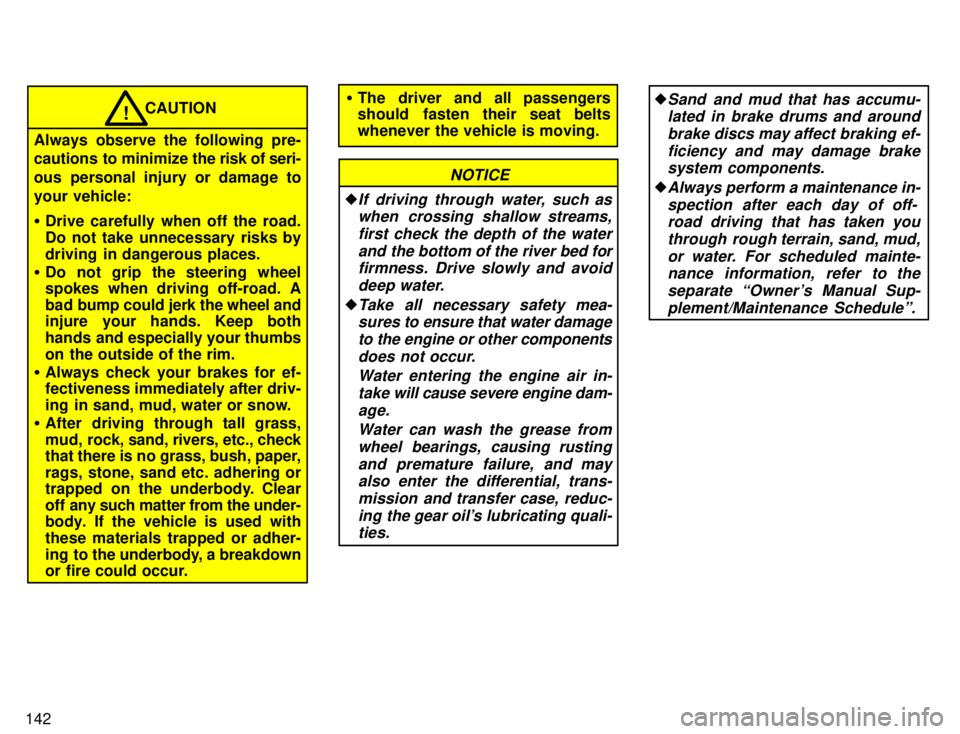
142
CAUTION!
Always observe the following pre-
cautions to minimize the risk of seri-
ous personal injury or damage to
your vehicle: � Drive carefully when off the road.
Do not take unnecessary risks by
driving in dangerous places.
� Do not grip the steering wheel
spokes when driving off-road. A
bad bump could jerk the wheel and
injure your hands. Keep both
hands and especially your thumbs
on the outside of the rim.
� Always check your brakes for ef- fectiveness immediately after driv-
ing in sand, mud, water or snow.
� After driving through tall grass,
mud, rock, sand, rivers, etc., check
that there is no grass, bush, paper,
rags, stone, sand etc. adhering or
trapped on the underbody. Clear
off any such matter from the under-
body. If the vehicle is used with these materials trapped or adher-
ing to the underbody, a breakdown
or fire could occur.
�The driver and all passengers
should fasten their seat belts
whenever the vehicle is moving.
NOTICE
�If driving through water, such as
when crossing shallow streams,
first check the depth of the waterand the bottom of the river bed forfirmness. Drive slowly and avoid
deep water.
�Take all necessary safety mea-sures to ensure that water damage
to the engine or other components does not occur.
Water entering the engine air in-take will cause severe engine dam-
age.
Water can wash the grease fromwheel bearings, causing rusting
and premature failure, and mayalso enter the differential, trans-
mission and transfer case, reduc- ing the gear oil's lubricating quali-ties.
�Sand and mud that has accumu-lated in brake drums and around
brake discs may affect braking ef-ficiency and may damage brakesystem components.
�Always perform a maintenance in-
spection after each day of off-road driving that has taken you
through rough terrain, sand, mud, or water. For scheduled mainte-nance information, refer to the
separate Owner's Manual Sup-
plement/Maintenance Scheduleº.
Page 146 of 217

143
Make sure you have ethylene-glycol
antifreeze in the radiator.
NOTICE
Do not use alcohol type antifreeze.
Check the condition of the battery and cables. Cold temperatures reduce the capacity of
any battery, so it must be in top shape to provide enough power for winter starting.Chapter 7-3 tells you how to visually in-
spect the battery. Your Toyota dealer and
most service stations will be pleased tocheck the level of charge.
Make sure the engine oil viscosity is
suitable for the cold weather.
See Chapter 7-2 for recommended vis-
cosity. Leaving a heavy summer oil in your
vehicle during winter months may cause
harder starting. If you are not sure about
which oil to use, call your Toyota deal- erÐhe will be pleased to help. Keep the door locks from freezing. Squirt lock de-icer or glycerine into the
locks to keep them from freezing. To open
a frozen lock, try heating the key before in-serting it. Use a washer fluid containing an anti-
freeze solution.
This product is available at your Toyota
dealer and most auto parts stores. Follow
the manufacturer's directions for how
much to mix with water.
NOTICE
Do not use engine antifreeze or any other substitute because it may
damage your vehicle's paint.
Do not use your parking brake when there is a possibility it could freeze. When parking, put the transmission into
Pº (automatic) or into first or reverse
(manual) and block the rear wheels. Do
not use the parking brake, or snow or wa-
ter accumulated in and around the parkingbrake mechanism may freeze, making it
hard to release. Keep ice and snow from accumulating
under the fenders.
Ice and snow built up under your fenders
can make steering difficult. During bad winter driving, stop and check under the
fenders occasionally. Depending on where you are driving,
we recommend you carry some emer- gency equipment.
Some of
the things you might put in the ve-
hicle are tire chains, window scraper, bag of sand or salt, flares, small shovel, jump- er cables, etc.
Winter driving tips
Page 147 of 217
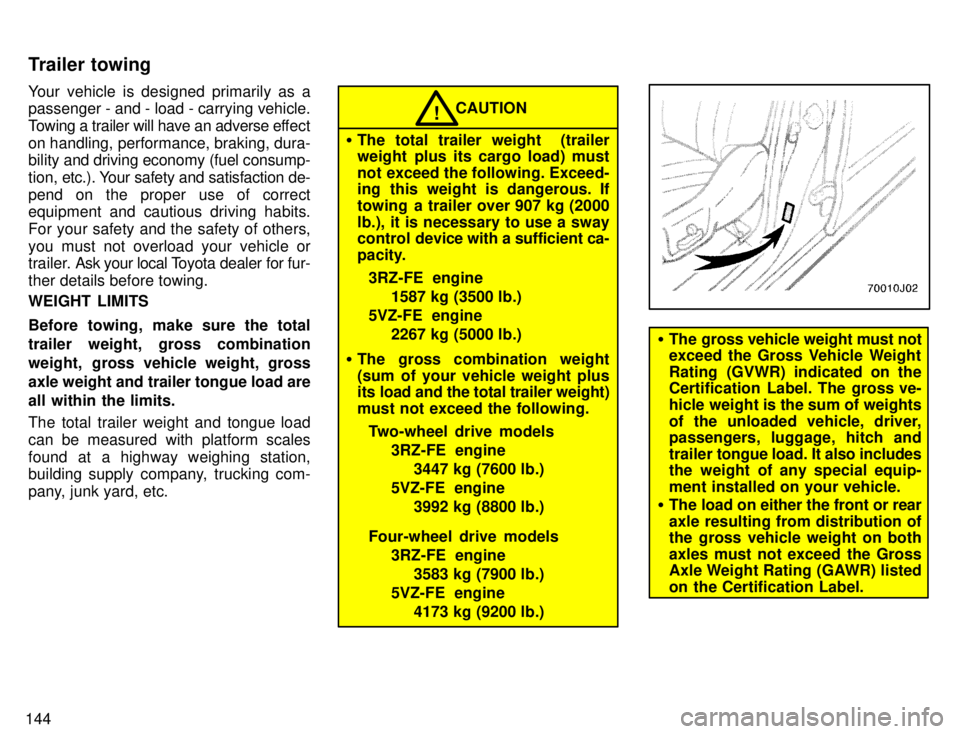
144Your vehicle is designed primarily as a
passenger - and - load - carrying vehicle.
Towing a trailer will have an adverse ef
fect
on handling, performance, braking, dura-
bility and driving economy (fuel consump-
tion, etc.). Your safety and satisfaction de-
pend on the proper use of correct
equipment and cautious driving habits.
For your safety and the safety of others,you must not overload your vehicle or
trailer. Ask your local T oyota dealer for fur-
ther details before towing. WEIGHT LIMITS
Before towing, make sure the total
trailer weight, gross combination
weight, gross vehicle weight, grossaxle weight and trailer tongue load are
all within the limits.
The total trailer weight and tongue load
can be measured with platform scales
found at a highway weighing station,
building supply company, trucking com-
pany, junk yard, etc.
CAUTION!
� The total trailer weight (trailer
weight plus its cargo load) must
not exceed the following. Exceed-
ing this weight is dangerous. If
towing a trailer over 907 kg (2000lb.), it is necessary to use a sway
control device with a sufficient ca-
pacity.
3RZ-FE engine 1587 kg (3500 lb.)
5VZ-FE engine 2267 kg (5000 lb.)
� The gross combination weight
(sum of your vehicle weight plus
its load and the total trailer weight)
must not exceed the following.
Two-wheel drive models 3RZ-FE engine3447 kg (7600 lb.)
5VZ-FE engine 3992 kg (8800 lb.)
Four-wheel drive models 3RZ-FE engine 3583 kg (7900 lb.)
5VZ-FE engine 4173 kg (9200 lb.)
�The gross vehicle weight must not
exceed the Gross Vehicle Weight
Rating (GVWR) indicated on the
Certification Label. The gross ve-
hicle weight is the sum of weights
of the unloaded vehicle, driver, passengers, luggage, hitch and
trailer tongue load. It also includes
the weight of any special equip-
ment installed on your vehicle.
� The load on either the front or rear
axle resulting from distribution of
the gross vehicle weight on both
axles must not exceed the Gross
Axle Weight Rating (GAWR) listed
on the Certification Label.
Trailer towing